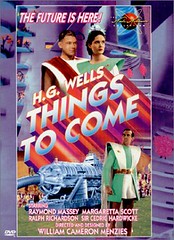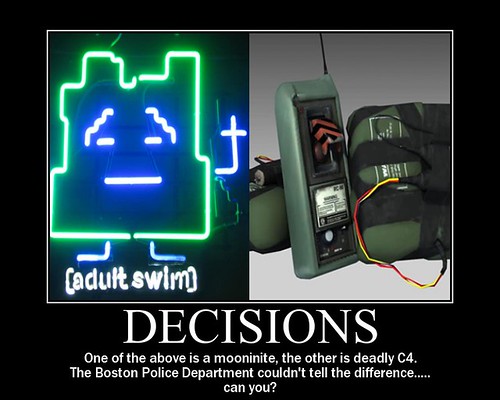It's shaping up to be interview week here at Thumb Jig. Woody and Billy, 'nuff said.
Monday, February 26, 2007
Woody Allen Interviews Billy Graham
Noam Chomsky Double Shot
Andrew Marr Interview in 1996
Ali G Interviews Chomsky
Saturday, February 24, 2007
The Double Slit Experiment
An experiment which raises far more questions than it answers, however, the most interesting lesson learned is that the simple act of observation effects the world at even the tiniest levels. Watch and find out what I mean.
30 Days as a Muslim
Unlike other reality shows like "Wife Swap" and "Survivor" this isn't about humiliation, this show is about education. Our technical age, I hope, will eliminate, or greatly reduce, our collective ignorance.
Mental illness and yellow wallpaper
 As the saying goes: “Those who write never need a check-up from the neck up.” The invigorating powers of the page can be utilized to pull people out of their depression. But this hasn’t always been so obvious. Victorian Era doctors treated psychological ailments the same as physical ones with disastrous results. It took a terrifying story of mental collapse, “The Yellow Wallpaper” by Charlotte Perkins Gilman, to help popularize modern therapy.
As the saying goes: “Those who write never need a check-up from the neck up.” The invigorating powers of the page can be utilized to pull people out of their depression. But this hasn’t always been so obvious. Victorian Era doctors treated psychological ailments the same as physical ones with disastrous results. It took a terrifying story of mental collapse, “The Yellow Wallpaper” by Charlotte Perkins Gilman, to help popularize modern therapy.
Tame by today’s standards, when first published the story provoked a physician to respond by stating that “it was enough to drive anyone mad to read it.” For those not familiar with the piece it gives us a glimpse of the journal entries of a woman experiencing a mental breakdown. At first she feels alienated. Her husband, a physician, misdiagnoses her sickness, locking her in a dark nursery away from any social interaction. As the woman sinks deeper into her imaginary world she obsesses about the ugly yellow wallpaper in her room. She sees crepuscular visions in the pattern, a non-linear narrative about toadstools and an encaged woman. By the end, she inhabits these nightmarish visions, irrevocably immersed in her lunacy.
This is loosely based on true events in Gilman’s life. She in reality had melancholia and her doctor at the time instructed her to avoid people, try not to engage in matters intellectual and above all never write again. After following the doctor’s orders she noticed her condition hadn‘t improved, instead the opposite was painfully true. Disregarding the physician’s misdirection, Gilman discovered her own cure, subsequently retelling a fictionalized account of her ordeal in “The Yellow Wallpaper”.
Upon it’s publication in 1891 she received instantaneous praise. One specialist wrote to say it was “the best description of incipient insanity“ he had ever read. There is even a case of a woman with the same disease who was cured after heeding the advice prescribed by Gilman‘s cautionary tale.
As for the author’s doctor who almost led her into mental ruin, Gilman sent him a copy of the story but he never replied. However, she heard years later that he augmented his treatment of the illness, after being one of many to realize the differences between physical and mental afflictions.
Thursday, February 22, 2007
Today's word is cannabis

Can you say cannabis boys and girls? Author Ricardo Cortes just published a children's book called "It's just a plant" which tells the story of a little girl who finds her parents using pot. She journeys to a cannabis farm and discovers it's illegality. The book is designed to help promote discussion between parents and children about responsible drug use, but it also wants to lift the stigma currently assigned to weed, it is just a plant after all.

Predictably, world-is-flat conservatives like O'Reilly misconstrue the tale as an endorsement of marijuana use instead of simply an educational tool much how closeted hate-mongers like Savage view Sex Ed as permission for premarital intercourse. The "Just Say No" mantra didn't work in the '80s and it doesn't work now, not for sex, not for junk food and certainly not for drugs. Tell the truth about drug laws, explain how the origins were racist and were simply enacted to drive Mexicans back over the border (the more things change the more they stay the same, eh?).
Read the book and decide for yourself if it is dangerous or not. Whichever conclusion you draw there is no question that it will spark a much-needed debate.
Wednesday, February 21, 2007
Nineteen Eighty-Four
That's right, the whole bloody movie. Ain't Google video grand?
Stupid Design
Scientist and Nova contributor, Neil deGrasse, talks about some of the universe's imperfections.
Tuesday, February 20, 2007
"This can't possibly be the A team"
Damn, I love this video so much I just couldn't resist. Props to Matt for bringing this to my attention.
Monday, February 19, 2007
Sunni side down
 Lately I've been having trouble keeping all the pieces of the Iraqi puzzle straight in my head. And now that the Bush Administration has grabbed Iran by the collar and dragged them into the fracas it's even more difficult to untangle the distortions we've been given. It's true, Bush and his handlers paint with broad strokes, so I've been trying to get to the bottom of this complex and highly-nuanced issue.
Lately I've been having trouble keeping all the pieces of the Iraqi puzzle straight in my head. And now that the Bush Administration has grabbed Iran by the collar and dragged them into the fracas it's even more difficult to untangle the distortions we've been given. It's true, Bush and his handlers paint with broad strokes, so I've been trying to get to the bottom of this complex and highly-nuanced issue.
Starting at the beginning and keeping it as simple as possible - Saddam Hussein was a member of the Baath party, a party made up of Sunnis. They held control of Iraq until Hussein's unseating. Because of America's initial decision to exclude the Sunnis from the government after our invasion the Sunnis felt jilted and began carrying out the majority of the attacks against American soliders.
As for the Shiites, the Iranian population is largely Shiite and have most likely been providing weaponry to Iraqi Shiites to some degree. But as for the Shiites' feelings toward our troops, they don't really have a beef with them. We're the ones who put the Shiites in charge, forming the first Shiite-centric State in the middle east. Do some of these weapons coming over from Iran kill some of our boys and girls in uniform? Probably. However, the bulk of the deliberate attacks on our soldiers are launched by angry Sunnis, and guess who's giving them their instruments of destruction. That's right, Saudi Arabia, whose government is run by Sunnis. What's the liklihood we'll be demonizing the Saudi royal family anytime soon?
At least with this war the press seems to be treading lightly, asking some questions and trying to hide their true nature of being the White House's lap dogs. Yet this is something that should be brought up and discussed. The reason, I feel, it's not is because this narrative doesn't fit nicely in a ten second sound bite.
Sunday, February 18, 2007
What are we waiting for?
Entertaining, 17-minute documentary coming out of the UK chapter of Green Peace about the inefficiency of our current energy system. The remedy: instead of a centralized power system with giant factorys and nuclear power plants, have a decentralized system which combines heat and power. This will recapture the third of the energy lost in transit as is the standard with the current system.
Saturday, February 17, 2007
Race doesn't exist
 Race is an artificial human construct This may be a bit shocking especially to those of us who live in America where racism has shaped so many of our affairs, but scientifically one's race cannot be defined. There's no gene for race and if you trace anyone's genealogy back far enough we all come from a common ancestor.
Race is an artificial human construct This may be a bit shocking especially to those of us who live in America where racism has shaped so many of our affairs, but scientifically one's race cannot be defined. There's no gene for race and if you trace anyone's genealogy back far enough we all come from a common ancestor.
First the difference between ethnicity, race and nationality. Ethnicity is a person's cultural identity while nationality is the country of one's birth and/or any additional nations a person chooses to pledge allegiance to. Race, by traditional standards, is simply a way to describe skin color. So, Tony Danza's ethnicity is Italian, his nationality is American and his race is Caucasian. You can alter nationality but not ethnicity or race.
Racists have tried to overcome this problem of nebulousness which always ends in incoherence. Take the example of South Africa's National Party during Apartheid. They wanted to split the country into Blacks, Indians and Whites. The way they determined which were which was through appearance alone. When this failed to fully encompass the population of Indians, who were thought to be a racial mix, an individual's parents were considered. If a person who was white in appearance had one "coloured parent" then they would be categorized as an Indian. Because the wording of the law was based on a person's physical characteristics often what became the deciding factor was whether or not a comb could pass through one's hair or an examination of the flatness of one's nose.
This goes to show how governments have played upon racism to divide a population against each other. Much like religion, I believe our government is currently fanning racial flames to create social rifts. Instead of a centralized opposition to established corruption we're bickering amongst ourselves over a superficial concept.
Sources:
Where I Drown
Socialist Standard
Friday, February 16, 2007
Is Shakespeare Dead?
"Are we to believe that William Shakespeare who had to master virtually the entire library of human kind, all but created our modern english language, and had the largest vocabulary of any english writer in history died not owning a single book?" So begins Mark Twain's "Is Shakespeare Dead?" which challenges the long-held, foundationless belief that Shakespeare wrote the works of Shakespeare. Here we learn Shakespeare never had a formal education, was a second-rate actor and had several plays written years after his death. Who actually wrote the works of Shakespeare? You'll have to watch the video to find out.
Monday, February 12, 2007
Independent Media in a time of war
Vocal polemicist and host of Democracy Now!, Amy Goodman, discusses the way American reporting has degenerated into something identical to State-sponsored media. We're not just talking about Fox News either. Some of the most venerable news outlets, such as CNN, is placed under Goodman's microscope, and it's tragic to find how lop-sided toward the military American coverage is. A highlight from the short, 30-minute documentary is Amy's suggestion that 24-hour networks invite doctors along with retired Generals onto their evening "newscasts" to inform people of how the recently-deployed bombs the General talked about in the previous segment effects the human targets on the ground.
A major theme presented in the film is the power of images. For a deeper analysis on the topic the ever-illuminating Susan Sontag wrote an exquisite book entitled Regarding the Pain of Others and is well worth your time.
Saturday, February 10, 2007
Bush's Budget Blunders or Save NPR!
 Why does Bush like to pick on public broadcasting so much? Does he have something against Burt and Ernie? Maybe it's because they don't qualify conjecture and gutter-speak as hard news. Or is it because they refuse to fellate the administration around the clock like other news outlets I could name? I think the answer to these questions is a resounding yes.
Why does Bush like to pick on public broadcasting so much? Does he have something against Burt and Ernie? Maybe it's because they don't qualify conjecture and gutter-speak as hard news. Or is it because they refuse to fellate the administration around the clock like other news outlets I could name? I think the answer to these questions is a resounding yes.
While his new budget proposal gives assloads of money to the Pentagon it also helps one of our most persecuted minorities - the rich. Those tax cuts Bush wants to make permanent gives the richest one percent thirty-one percent of the cuts and the bottom forty percent (you and I) a measly four percent. But never fear I'm sure those old, white men at the top will surely demonstrate their magnanimity before the beginning of the next war.
And so NPR is facing another attack along with significant cuts to child-care assistance and the Headstart program. PBS has stated that without these funds they might have to jettison "Seasame Street and "Arthur". Bush's thinking is backwards and upside down. Hell, this interview alone should be reason enough to keep NPR strong. Sign this petition and send a message to Congress saying you support upstanding Journalism and stand against fattening the bank accounts of multi- millionaires
His Holiness comes to Wisconsin
 Just a brief note, the Dalai Lama will be speaking at the University of Wisconsin - Madison and giving lessons at the Veterans Memorial Coliseum / Alliant Energy Center. The lessons take place May 2, 3 & 4 and his public speech will occur on the 4th. Tickets for his teachings are a bit pricey ($50-$175) but it's only $25 for admission to the talk and 4,000 FREE tickets will be given to UWM students. So, be sure to give a Madtown undergrad a call and get hooked up with some sweet Dalai Lama ticket action. Here's some more info on the event.
Just a brief note, the Dalai Lama will be speaking at the University of Wisconsin - Madison and giving lessons at the Veterans Memorial Coliseum / Alliant Energy Center. The lessons take place May 2, 3 & 4 and his public speech will occur on the 4th. Tickets for his teachings are a bit pricey ($50-$175) but it's only $25 for admission to the talk and 4,000 FREE tickets will be given to UWM students. So, be sure to give a Madtown undergrad a call and get hooked up with some sweet Dalai Lama ticket action. Here's some more info on the event.
Thursday, February 08, 2007
What Is Intelligence, Anyway? by Isaac Asimov
What is intelligence, anyway? When I was in the army, I received the kind of aptitude test that all soldiers took and, against a normal of 100, scored 160. No one at the base had ever seen a figure like that, and for two hours they made a big fuss over me. (It didn't mean anything. The next day I was still a buck private with KP - kitchen police - as my highest duty.)
All my life I've been registering scores like that, so that I have the complacent feeling that I'm highly intelligent, and I expect other people to think so too. Actually, though, don't such scores simply mean that I am very good at answering the type of academic questions that are considered worthy of answers by people who make up the intelligence tests - people with intellectual bents similar to mine?
For instance, I had an auto-repair man once, who, on these intelligence tests, could not possibly have scored more than 80, by my estimate. I always took it for granted that I was far more intelligent than he was. Yet, when anything went wrong with my car I hastened to him with it, watched him anxiously as he explored its vitals, and listened to his pronouncements as though they were divine oracles - and he always fixed my car.
Well, then, suppose my auto-repair man devised questions for an intelligence test. Or suppose a carpenter did, or a farmer, or, indeed, almost anyone but an academician. By every one of those tests, I'd prove myself a moron, and I'd be a moron, too. In a world where I could not use my academic training and my verbal talents but had to do something intricate or hard, working with my hands, I would do poorly. My intelligence, then, is not absolute but is a function of the society I live in and of the fact that a small subsection of that society has managed to foist itself on the rest as an arbiter of such matters.
Consider my auto-repair man, again. He had a habit of telling me jokes whenever he saw me. One time he raised his head from under the automobile hood to say: "Doc, a deaf-and-mute guy went into a hardware store to ask for some nails. He put two fingers together on the counter and made hammering motions with the other hand. The clerk brought him a hammer. He shook his head and pointed to the two fingers he was hammering. The clerk brought him nails. He picked out the sizes he wanted, and left. Well, doc, the next guy who came in was a blind man. He wanted scissors. How do you suppose he asked for them?"
Indulgently, I lifted my right hand and made scissoring motions with my first two fingers. Whereupon my auto-repair man laughed raucously and said, "Why, you dumb jerk, He used his voice and asked for them." Then he said smugly, "I've been trying that on all my customers today." "Did you catch many?" I asked. "Quite a few," he said, "but I knew for sure I'd catch you." "Why is that?" I asked. "Because you're so goddamned educated, doc, I knew you couldn't be very smart."
And I have an uneasy feeling he had something there.
Things to Come (1936)
 This 1936 science fiction thriller was written by H.G. Wells and is based on his 1933 book The Shape of Things to Come. It documents the destruction of "Everytown" which is decimated during the Christmas of 1940 when a massive war is launched. The fighting persists for decades, fracturing civilization into tiny, frightened communities. A man known as "The Boss" takes control of Everytown, but is threatened by a stranger who flies in from the outside. He helms a society called "Wings over the World" whose aim is to unite all humanity with science. After the Boss and the Stranger clash, science prevails and succeeds in consolidating the warring communities. After achieving this the new society constructs a controversial space program and prepares for their first flight.
This 1936 science fiction thriller was written by H.G. Wells and is based on his 1933 book The Shape of Things to Come. It documents the destruction of "Everytown" which is decimated during the Christmas of 1940 when a massive war is launched. The fighting persists for decades, fracturing civilization into tiny, frightened communities. A man known as "The Boss" takes control of Everytown, but is threatened by a stranger who flies in from the outside. He helms a society called "Wings over the World" whose aim is to unite all humanity with science. After the Boss and the Stranger clash, science prevails and succeeds in consolidating the warring communities. After achieving this the new society constructs a controversial space program and prepares for their first flight.
In addition to predicting something eerily similar to World War II and the first moon landing, the set design is impressive, giving a not-so-subtle nod to Fritz Lang and the plot is restless and smart. Much to my surprise, this film has aged extraordinarily well, rarely drifting into didacticism. Although this is undoubtedly a "message movie" it's neither optimistic nor pessimistic, but succeeds in being realistic.
Monday, February 05, 2007
Gnarls Barkley - Smiley Faces
This is Gnarls Barkley's new, Zelig-style video for "Smiley Faces," featuring Dennis Hopper, Man!
Sunday, February 04, 2007
Religious Triple Feature
Trouble With Atheism
Richard Dawkins: The God Delusion
Life of Buddha
Have we always been a Christian Nation?
One of the fastest growing cliches/falsehoods, which stands the chance of becoming fact, is the idea that America was solely founded by Christians for Christians. This is a dangerous fiction. It is being used to suffocate pluralism and erect a theocratic Vampirarchy. This stands contrary to everything the founding fathers intended.
The Declaration of Independence:
Think of the concept of the Declaration of Independence in the context of this Bible verse:
13 Submit yourselves to every ordinance of man for the Lord's sake: whether it be to the king, as supreme;
14 Or unto governors, as unto them that are sent by him for the punishment of evildoers, and for the praise of them that do well.
15 For so is the will of God, that with well doing ye may put to silence the ignorance of foolish men:
16 As free, and not using your liberty for a cloke of maliciousness, but as the servants of God.
17 Honour all men. Love the brotherhood. Fear God. Honour the king.
18 Servants, be subject to your masters with all fear; not only to the good and gentle, but also to the froward.
1 Peter 2: 13-18
Take the core of Jefferson's argument for his tender nation: "...That to secure these rights, Governments are instituted among Men, deriving their just powers from the consent of the governed, — That whenever any Form of Government becomes destructive of these ends, it is the Right of the People to alter or to abolish it, and to institute new Government, laying its foundation on such principles and organizing its powers in such form, as to them shall seem most likely to effect their Safety and Happiness." What could be more opposed to Biblical teaching than revolution? The scriptures emphatically state that the power of nations are precipitated by God. According to the "Declaration" people animate the engine of our government.
Founding Fathers:
Thomas Paine wrote a book called The Age of Reason in which he openly denounces Christianity. Paine stated about Religion in general: "I do not believe in the creed professed by the Jewish Church, by the Roman Church, by the Greek Church, by the Turkish Church, by the Protestant Church, nor by any Church that I know of. My own mind is my own Church."
Jefferson did not go any easier on the faith in his criticism of the religion, "The day will come when the mystical generation of Jesus…will be classed with the fable of the generation of Minerva in the brain of Jupiter." He also said, "The First Amendment has erected a wall of separation between Church and State," which should lay that debate to rest.
And if you're still not convinced none other than George Washington himself commented on the essence of our nation, "The Government of the United States of America is not, in any sense, founded on the Christian Religion."
The truth was and still remains that our founding fathers escaped King George and the Anglican Church in search of a new, multi-cultural society. One where issues can be debated and differing perspectives can be explored without interference. This is a system that continues to be as beautiful as it is radical.
Friday, February 02, 2007
A crime of consent
 "Rightful liberty is unobstructed action according to our will within limits drawn around us by the equal rights of others. I do not add 'within the limits of the law' because law is often but the tyrant's will, and always so when it violates the rights of the individual."
"Rightful liberty is unobstructed action according to our will within limits drawn around us by the equal rights of others. I do not add 'within the limits of the law' because law is often but the tyrant's will, and always so when it violates the rights of the individual."
-- Thomas Jefferson
Years ago when I was still shedding the ideas my private school of 13 years burdened me with, I, participating in an act of youthful rebellion, was sharing a joint with my best friend in his parent's garage. At that time I considered myself a "liberal conservative" and told my friend, an O'Reilly-worshipping neocon, this fact. He damn near choked; I had self-applied the dirtiest of possible labels - liberal. He asked me what possessed me to say such a thing, so I went on to describe a few conservative positions I held, like preserving the "Culture of Life" a.k.a. anti-abortion, but I also had budding liberal tendencies such as advocating a moritarium on the War on Drugs. Always quick with an answer my friend jumped in saying I'm right about my Pro-Life stance, a position I assume he holds to this day, however the entire illicit substances debate isn't left or right.
Somehow I suspect he's correct, not just about the decriminalization of drugs but about the larger issue of victimless crimes. Sometimes called "consensual crimes" a victimless crime is self-explanitory. Victimless crimes are most often identified with drug use, yet prostitution, sodomy, pornography as well as plenty of other consensual pursuits are prohibited by this kind of legislation.
What is the justification for victimless crimes? Often these laws are propped up on a moral basis. If individuals were permitted ready access to weed and hookers the moral foundation of society would erode and break apart. Many times religious undertones decorate these arguments. Also, the collateral damage of these activities are weighed. For instance, without seat belt laws insurance rates spike and everybody pays a higher premium.
It is this specious reasoning that constricts personal freedom. I categorical reject the first argument. The purpose of the law is not to legislate morality, if this were true 99.9% of Congress would be exchanging their three-piece suits for single-piece orange ones. The purpose of the law is to prevent the violation of an individual's civic rights and to prevent the damage of another's property. By this definition a victimless crime is oxymoronic. The second point also seems flimsy. If we're worried about driving up insurance costs why not make cigarettes and alcohol illegal? What of the destruction done by drunk drivers every year, is this not reason enough to consider this type of law? You need to look no further than the chapter on Prohibition during the 1920s in your closest history text book to find out that prohibition of every kind doesn't work.
I don't just contend that victimless crimes are pointless, they bare pernicious consequences for a community. 4 million Americans will be arrested for consensual crimes and 350,000 from this group will be convicted. Our tax dollars are going toward housing and feeding these people. Too much manpower is being devoted to the investigation and apprehension of "criminals" who hurt no one, more rapists and murders would be brought to justice if the local prostitution ring became a legitimate service. Drug dealers are empowered by anti-drug laws because they become the sole providers of the product. If it were legalized and taxed then drug dealers would be rendered obsolete.
As it turns out my friend was right, this shouldn't be a question of left or right, it's a question of control. People should be free to indulge in their vices and utilize their leisure time the way they deem fit as long as they do not encroach upon another's ability to do the same. This is another method of control by legislators. Artificial boundaries pull double duty giving the illusion of a caring governance while limiting the range of its people. You can't child-proof the planet. One of the best tests of a nation's freedom is to examine the number of arbitrary restrictions it imposes on it's electorate.


